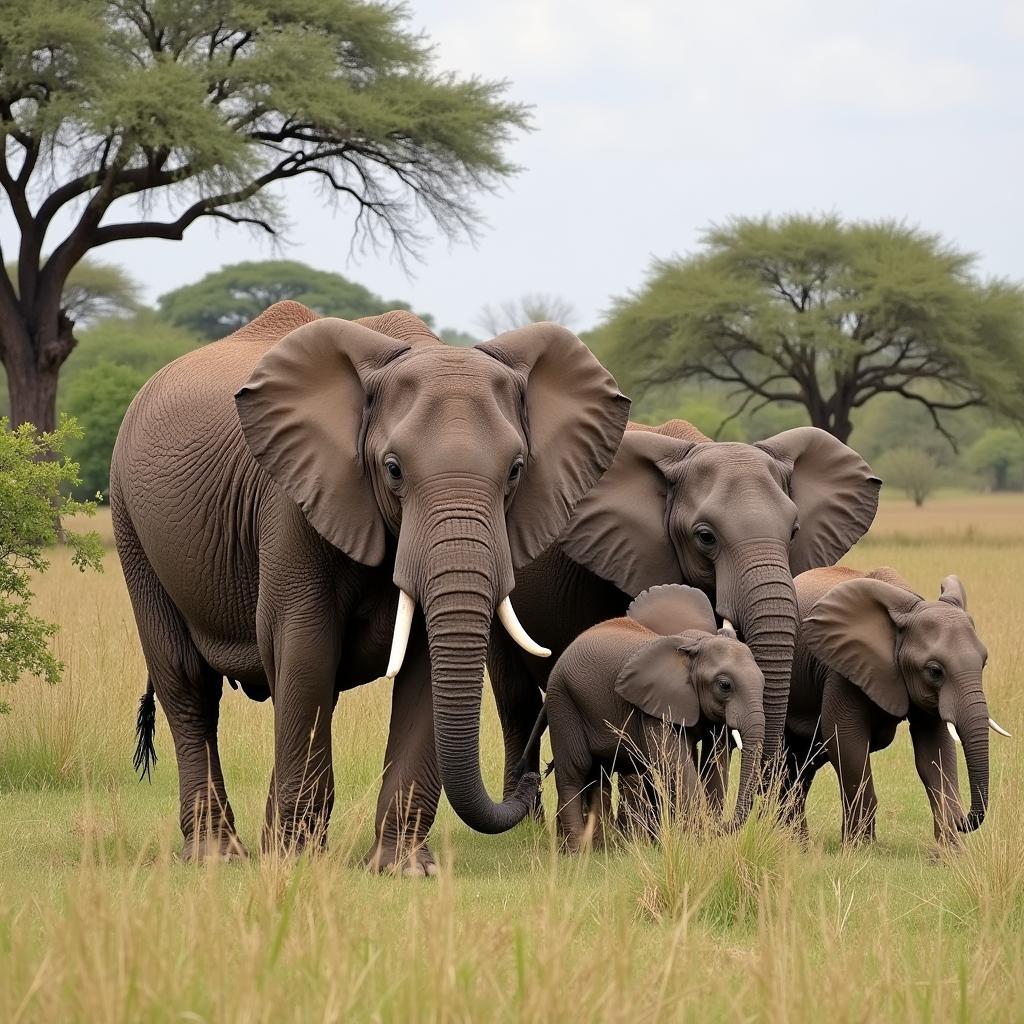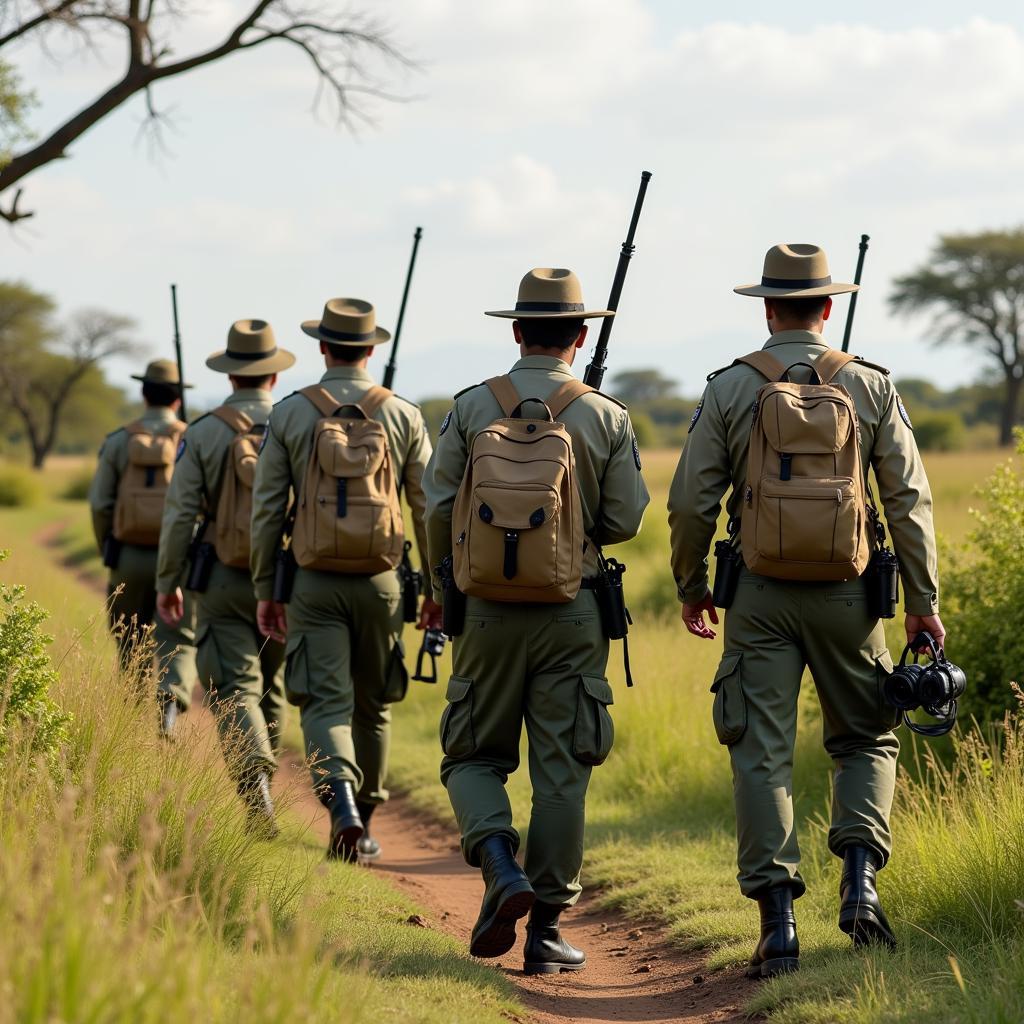The African Bush Elephant Population: A Story of Survival
The African Bush Elephant Population, a majestic symbol of Africa’s wildlife, faces an uncertain future. These gentle giants, once abundant across the continent, are now grappling with habitat loss, poaching, and human-wildlife conflict, leaving their numbers in a precarious state.
Understanding the Threats to African Bush Elephants
The plight of the African bush elephant is a complex issue, interwoven with ecological, economic, and social factors. Understanding these threats is crucial to developing effective conservation strategies.
Habitat Loss and Fragmentation
As human populations grow and expand, the natural habitats of African bush elephants are being converted into agricultural land, settlements, and infrastructure. This habitat loss not only reduces the space available for elephants to roam but also fragments their populations, isolating groups and disrupting their social structures. This isolation can lead to inbreeding and reduced genetic diversity, further weakening the population.
Poaching for Ivory
The illegal ivory trade remains a significant threat to African bush elephants. Driven by demand in Asia, particularly China, poaching gangs continue to target elephants for their tusks, decimating populations and leaving a trail of devastation in their wake. The high prices fetched for ivory fuel a lucrative black market, attracting organized crime and undermining conservation efforts.
Human-Wildlife Conflict
As human populations encroach on elephant habitats, encounters between the two species are becoming increasingly common. These encounters often lead to conflict, with elephants raiding crops, damaging property, and even causing human fatalities. This conflict not only poses a risk to human lives and livelihoods but also fuels negative perceptions of elephants, hindering conservation efforts.
 African Bush Elephant Family
African Bush Elephant Family
Conservation Efforts: A Glimmer of Hope
Despite the challenges, there is hope for the African bush elephant. Dedicated individuals and organizations across the continent are working tirelessly to protect these iconic animals and ensure their long-term survival.
Anti-Poaching Initiatives
Across Africa, governments, NGOs, and local communities are joining forces to combat poaching. Anti-poaching patrols, sniffer dog units, and advanced surveillance technologies are being deployed to deter poachers and intercept illegal ivory shipments. These efforts, while challenging, are yielding positive results, with poaching rates declining in some areas.
Community-Based Conservation
Recognizing that local communities are crucial to conservation success, many initiatives are empowering communities to protect their own wildlife. Community-based conservation programs provide alternative livelihoods, promote sustainable land management practices, and foster a sense of ownership over natural resources, creating a win-win situation for both people and elephants.
Translocation Programs
In some instances, translocation programs are used to mitigate human-wildlife conflict or re-establish elephant populations in areas where they have been extirpated. This involves capturing and moving elephants to new habitats, a complex and logistically challenging undertaking that requires careful planning and management.
The Future of the African Bush Elephant: A Collective Responsibility
The fate of the African bush elephant rests in our hands. As global citizens, we have a collective responsibility to support conservation efforts, raise awareness about the plight of these magnificent creatures, and advocate for policies that promote their long-term survival. By working together, we can ensure that future generations inherit a world where African bush elephants continue to roam free, their majestic presence gracing the African savanna for centuries to come.
FAQs about African Bush Elephant Population
What is the current population of African bush elephants?
The most recent estimates suggest that there are around 415,000 African bush elephants left in the wild.
What are the main threats to African bush elephants?
The three main threats are habitat loss, poaching for ivory, and human-wildlife conflict.
What can I do to help protect African bush elephants?
You can support reputable conservation organizations, raise awareness about the issue, and make informed choices as a consumer to avoid products that contribute to the illegal wildlife trade.
 Anti-Poaching Patrol in Africa
Anti-Poaching Patrol in Africa
Need More Information?
Discover more about the fascinating world of African bush elephants through our other informative articles:
- Learn about the unique body parts of African elephants
- Explore the historical and current range of African bush elephants
- Uncover the secrets behind the fascinating teeth of African bush elephants
- Delve into the world of the African desert elephant, a close relative
- Explore the social dynamics of African jungle animals living in herds
For any inquiries or assistance, our dedicated team is available 24/7. Contact us at +255768904061, email us at kaka.mag@gmail.com, or visit our office at Mbarali DC Mawindi, Kangaga, Tanzania.

